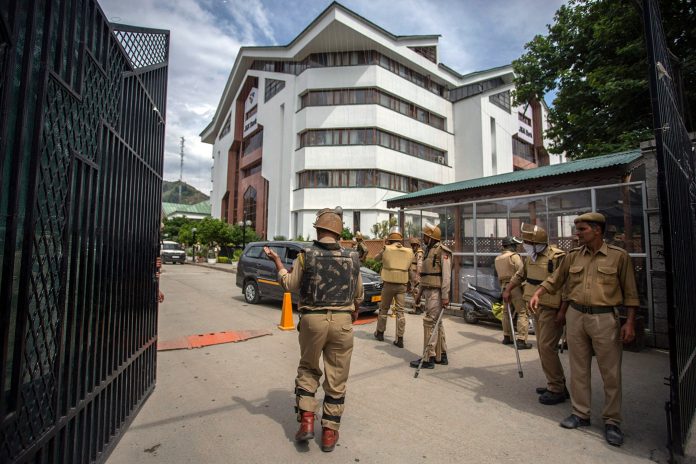
- 937Shares
Srinagar: Srinagar deputy mayor Sheikh Imran is the first politician to be caught up in the eight-month-old criminal investigations into alleged irregularities at the Jammu and Kashmir Bank, the state’s most powerful financial institution.
The J&K income tax department Tuesday raided eight premises belonging to Imran’s company, the Kehwah group — six in Srinagar and one each in Delhi and Bengaluru. Imran is a member of the Sajad Lone-led People’s Conference party.
Sources in the J&K administration told ThePrint that they expect the names of more politicians, particularly from the Peoples Democratic Party (PDP), to crop up in the investigations.
Although the initial FIR pertains to alleged illegal appointments made in the bank, officials said the state’s anti-corruption bureau (ACB) has also been looking at loans default cases to ascertain if the defaulters used “political patronage” to influence the bank.
A senior bureaucrat said that Imran’s company is facing default proceedings after 23 of its accounts with the J&K Bank were declared non-performing assets for dues of over Rs 130 crore. The Reserve Bank of India (RBI) had asked the J&K Bank to declare that the Kehwah Group had committed banking fraud.
Sources further said that the bank allegedly sanctioned loans worth hundreds of crores of rupees in violation of guidelines and standard operating procedures.
Officials added that the ACB was also looking at loans given to individuals recommended by a former minister in the PDP government, Imran Aftab Ansari, who is now with the People’s Conference.
Imran remained unavailable for comment despite repeated phone calls to him. This report will be updated when he responds. Ansari too did not respond to phone calls.
ACB probing illegal appointments
The raids are being conducted after the state’s ACB filed an FIR last week over alleged illegal and fraudulent appointments made in J&K Bank during the tenure of the BJP-PDP government.
The state administration had Saturday sacked Pervez Ahmad Nengroo, chairman and managing director of J&K Bank in connection with the case, replacing him with R.K. Chhibber, the bank’s executive director. Following Nengroo’s sacking, ACB officials carried out raids at J&K bank’s M.A. Road headquarters in Srinagar and recovered 500 files.
“We are looking at roughly 1,200 appointments made between 2016 and 2019,” said a senior government official requesting anonymity. The period relates to Nengroo’s tenure as he was appointed in October 2016.
Despite repeated attempts to reach him, Nengroo was unavailable for comment. This report will be updated when he responds.
The PDP media advisor Suhail Bukhari said he wasn’t “qualified to talk” on the issue while other senior party leaders refused to comment.
A PDP source, however, told ThePrint “that there might be the chance of irregularities”.
“We are not saying that irregularities have not happened but why point out the tenure of just one individual?” the source asked. “Haven’t there been irregularities before the PDP government?”
Another senior government official said the alleged irregularities were first brought to fore by former finance minister in the PDP-BJP government Haseeb Drabu.
“Haseeb had talked of cleaning up the J&K Bank’s processes but that did not happen,” a senior central government official said. “It is my understanding that this became the trigger for him leaving his party. The issue is an old one.”
Drabu refused to comment on the issue.
A simmering row
A massive controversy broke last October when Governor Satyapal Malik accused the J&K Bank of appointing employees on political recommendations. The issue brought the bank’s management and Malik at loggerheads but the matter eventually subsided after grabbing headlines for a few days.
In November, however, the State Accountability Commission, headed by Malik, decided to treat the J&K Bank as a Public Sector Undertaking (PSU). The decision was revoked after a massive political outcry cutting across party lines.
Malik subsequently clarified that J&K Bank, which was registered as a government company under the Companies Act, would continue to be regulated by the Reserve Bank of India (RBI).
According to one source though, J&K bank never escaped Malik’s radar due to the “massive violation to procedural norms”.
“We have on many occasions pointed out the issues with the way J&K Bank functions but nothing concrete happened. Hence the step,” said the state government official.
Get the PrintEssential to make sense of the day's key developments
- 937Shares